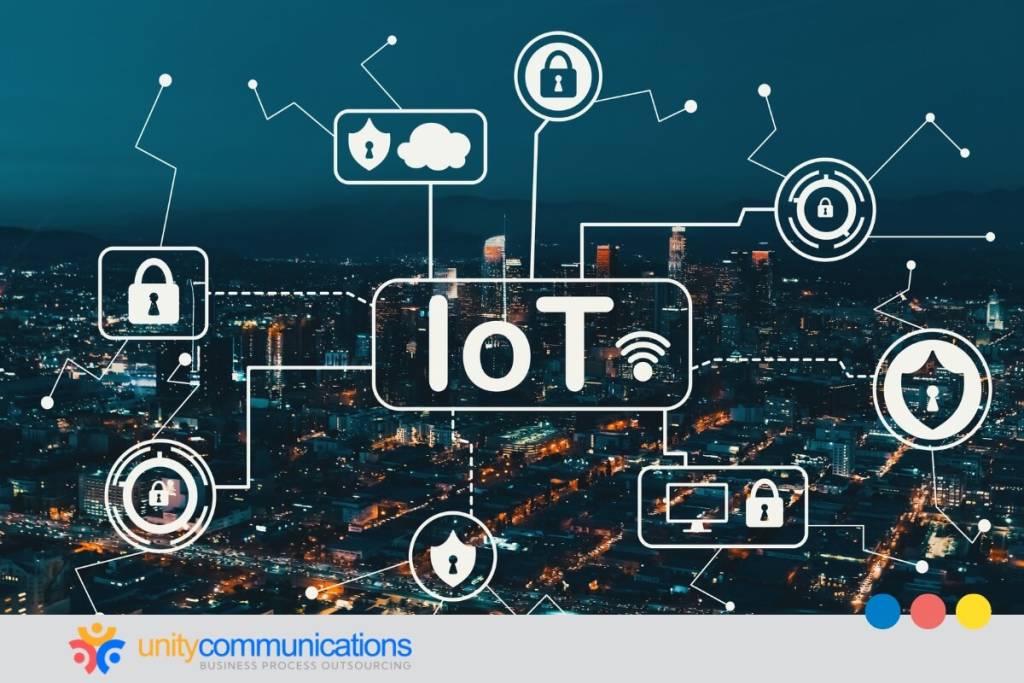IN THIS ARTICLE
Table of Contents
Business process outsourcing (BPO) providers continuously explore smart ways to streamline operations and maintain a competitive edge amid fast-paced market dynamics. They seek solutions that enable real-time data collection, task automation, and process optimization across their integrated systems.
The Internet of Things (IoT) has made such capabilities possible. This network of connected devices leverages the cloud to facilitate seamless information exchange, allowing personnel to prioritize core functions without worrying about manual data input.
Continue reading to learn how IoT devices enable BPO service providers to boost operational efficiency.
The relevance of IoT devices in BPO services

Accelerating back- and front-office processes while increasing cost savings is what BPO firms offer to client companies. Service providers charge hourly or monthly fees to allow access to their flexible and skilled human resources (HR).
However, a large talent pool is insufficient to meet the increasing demand for faster support and accurate data. The need to focus on growth-driven initiatives and complete routine tasks divides a team’s attention and makes it challenging to reach business targets.
Hence, BPO companies invest in IoT devices to improve service delivery and data management. They take advantage of these integrated, cloud-based tools to achieve the following benefits:
Enhance customer service
IoT platforms help BPO contact centers enhance customer support by delivering proactive solutions and data-driven responses to consumer inquiries. This technology enables self-service solutions, which customers prefer when addressing simple issues.
For instance, integrating artificial intelligence (AI)-powered virtual assistants (VAs) with IoT data allows customers to receive quick assistance when encountering smartphone bugs. The VA detects the issue using real-time data from the connected device and immediately lists troubleshooting steps for the consumer.
IoT devices also assist in personalizing BPO customer service. Call centers collect and analyze data from these platforms to understand how consumers use products or services. They use the insights to recommend feature updates that match customers’ usage patterns and preferences. This synergy leads to increased consumer satisfaction and brand loyalty.
Boost sales and marketing
To achieve a competitive advantage, BPO companies utilize IoT to help clients streamline their sales and marketing strategies. They use this interrelated computing tech to support these measures and make brands stand out:
- Understand customer needs and generate qualified leads. IoT-provided statistics reveal buying behavior and usage history. This data informs BPO teams’ personalization of marketing emails, social media ads, and promotional campaigns to maintain existing consumers or attract new ones.
- Create opportunities for upselling. For example, a third-party sales agency supporting an appliance company uses IoT data to know how outdated smart televisions affect consumers. The BPO team uses this knowledge to create and share targeted promotions for upgrades or maintenance plans.
- Provide proactive support and nurture leads. Analyzing data on how consumers engage with connected devices helps providers pinpoint potential issues. They then produce and disseminate troubleshooting guides via customers’ preferred communication channels, boosting the customer experience and building trust.
Expedite manufacturing and logistics
BPO companies specializing in manufacturing and logistics optimize IoT devices to speed up deliveries and address inefficiencies. These systems transform production at low costs in several ways:
- Accelerated logistics tracking. IoT sensors monitor the location and movement of raw materials, components, and finished products. This real-time visibility assists BPO companies in improving inventory management and reducing lead times.
- Predictive maintenance. IoT-enabled manufacturing equipment tracks vital parameters, such as temperature and energy consumption, to detect signs of potential failures. BPO companies then schedule maintenance proactively, minimizing unexpected downtime.
- Effective fleet management. IoT-powered telematics devices installed in shipping containers help providers check their real-time location, speed, and condition. They use this data to optimize routing and fuel efficiency, speeding up logistics operations.
- Enhanced quality control. BPO companies employ IoT sensor data to develop and implement quality assurance measures. These insights also help identify potential issues so firms can take corrective actions before defects impact sales.
Advance IT services
IoT devices aid BPO firms in advancing their information technology (IT) services. These interoperable systems help employees monitor servers, networks, and apps.
In particular, here’s how IoT technology is changing the BPO industry and allowing providers to monitor clients’ equipment performance, health, and security:
- IoT sensors installed in IT platforms track temperature, voltage, and usage patterns to predict when hardware components might fail. This capability enables BPO teams to schedule regular maintenance activities to minimize downtime and optimize system lifespan.
- Providers use IoT to automate routine IT service desk tasks. For example, IoT-powered chatbots analyze sensor data from endpoint devices to diagnose common technical issues and provide self-service troubleshooting guidelines.
- IoT devices are critical in strengthening cybersecurity measures. IoT-powered intrusion detection systems and endpoint security tools provide real-time monitoring of IT environments. During big data input and management, they help minimize human error that often results in data breaches.
- IT vendors use IoT to remotely detect the location and usage of laptops, mobile devices, and peripherals. This real-time visibility allows them to efficiently manage inventory, track asset utilization, and enforce policy compliance to avoid loss or theft.
Will IoT replace the BPO workforce?

Integrating IoT devices with BPO services will not replace personnel. Instead, this modern tech revolutionizes BPO roles and responsibilities to boost operational efficiency.
While IoT automates repetitive functions, BPO employees focus on higher-level services requiring human expertise. These tasks include data analysis, strategic consulting, and user experience (UX) design.
As IoT platforms generate massive data, third-party professionals can study patterns, interpret them, and translate insights into actionable recommendations. Human touch is also necessary to actively listen to and empathetically respond to customers’ concerns.
The bottom line

Maximizing IoT systems enables BPO companies to keep pace with the rapidly evolving business landscape. These connected, cloud-native devices help them enhance and personalize customer service, sales, and digital marketing. They also simplify the complex processes in manufacturing, logistics, and IT.
Despite some worries that IoT might overshadow human expertise, providers leverage this advanced tech to scale their workforce capabilities. The solution allows workers to prioritize core initiatives while streamlining time-consuming functions. Contractors also ensure the balance between automated and human-driven customer interactions.
Do you want to learn more about how IoT boosts operational efficiency in a BPO setting? Let’s connect and exchange insights. We can also discuss a potential agreement to enhance your routine tasks with our scalable HR and BPO solutions.





